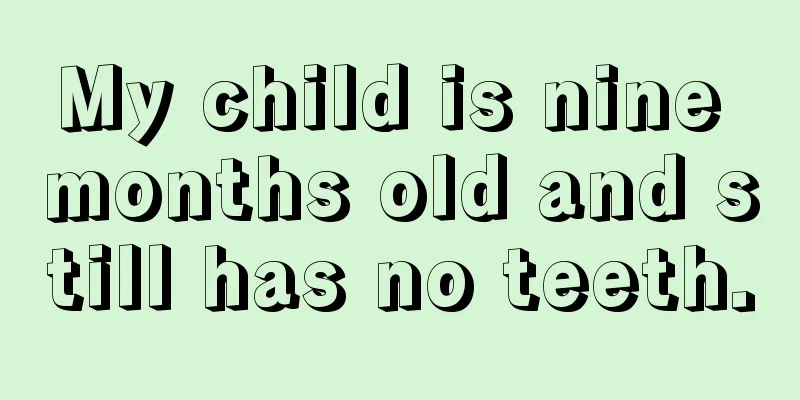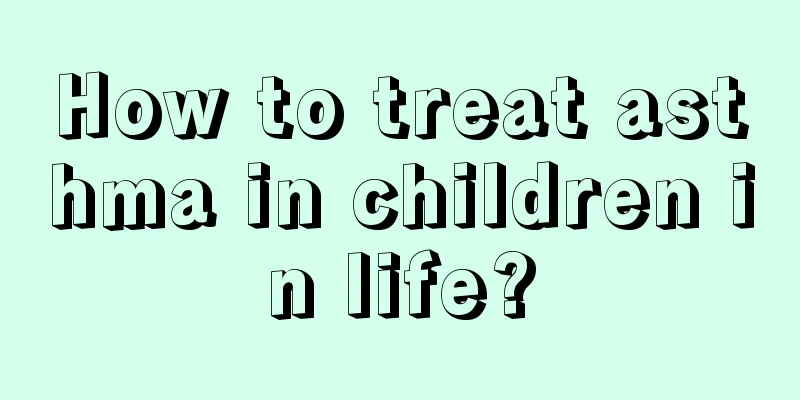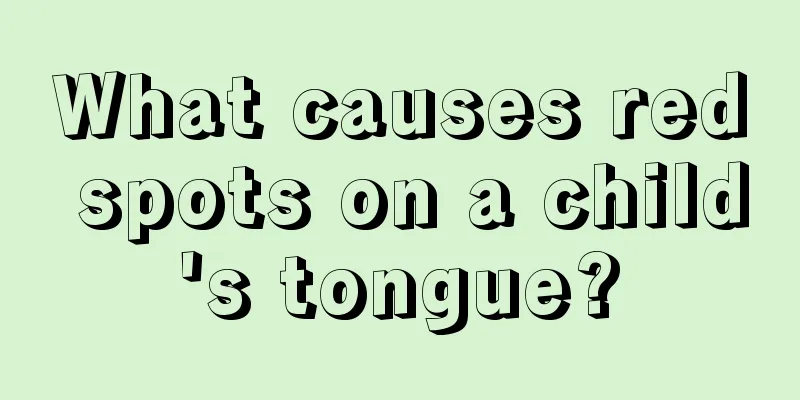My child is nine months old and still has no teeth.

|
Many women who have become mothers pay special attention to their children's growth, paying attention to when their children grow their first teeth and when they can walk and run. Generally speaking, babies will grow one tooth within one year of their birth. Of course, some babies will grow teeth at 8 months or even earlier. Therefore, it is normal for a baby not to have grown teeth at 9 months old. It does not mean that the baby is calcium deficient or physically poorly developed. Usually, babies will have the following symptoms after teething. Pay special attention to care during the teething period. It is normal for the first tooth to come out before the age of 1. The early or late eruption of a child's teeth is mainly related to genetics and has nothing to do with "calcium deficiency". Generally, children who have late teething have parents who also have late teething. If you don’t believe it, you can check with the elders in your family. There is no need to give your child calcium supplements just because he or she has not grown teeth at 9 months old. Symptoms of teething in babies Generally speaking, the baby's deciduous teeth will begin to erupt when the baby is 6 or 7 months old, but some babies may start to grow teeth as early as 4 months, or as late as 11 or 12 months. Generally, 2 or 3 months before the eruption of deciduous teeth, mothers will get some signs that their baby is about to grow teeth. These teething signs vary from person to person, but generally they are the following 7 types. 1. Bite. Teething babies may bite anything they see, from their own hands to their mother's nipples to even strangers' fingers. This is because the little ones want to relieve the pressure of the teeth growing under their gums by chewing. 2. Drooling. The baby's teething will especially stimulate the secretion of saliva, so the baby will drool when he is about three or four months old. 3. Rash on the chin or face. Teething can cause babies to drool, and if the baby's chin and facial skin are in contact with saliva for a long time, it is easy to develop allergic rashes. To avoid this phenomenon, mothers should wipe the baby's saliva frequently. 4. Mild cough. Teething stimulates saliva secretion, and too much saliva can cause your baby to feel nausea or cough. 5. Swollen and painful gums. Some babies may experience red, swollen, and painful gums, especially when the first teeth and molars come out. If your baby's gums are oozing pus or the surrounding area is hot, it means that the gums are infected and you should seek medical attention immediately. 6. Crying. As the tooth tip gets closer to the top of the gum, the inflammation will become more severe, and the constant pain will cause the baby to cry frequently. 7. Refusing to eat. Teething babies often become fussy during feedings. He may appear eager to suck milk because he wants to put something in his mouth, but once he starts sucking milk, his gums will hurt due to the sucking action, and he will appear to have no interest in sucking milk. Babies who have already started eating solid food may also refuse to eat solid food. At this time, mothers need to supplement their nutrition by feeding their babies breast milk or formula milk. If your baby refuses to eat seriously, you should take him to see a doctor. How to care for your baby's teeth 1. Teething is generally painless, but some babies may feel uncomfortable and irritable. At this time, the mother can wrap moist gauze on a clean finger and gently massage the baby's gum tissue to relieve the baby's gum discomfort during teething. 2. Teething will not cause fever, but babies in the teething period like to grab things and put them in their mouths, which can easily cause bacterial infection and lead to fever. If a baby in the teething period has a fever, it is usually caused by other reasons and you should take him to see a doctor. 3. When the baby's first tooth comes out, the mother should help him brush his teeth. It is recommended to take it twice a day, the most important time being before bed at night. Mothers should use a soft baby toothbrush, squeeze a small amount of toothpaste on it, and gently brush their baby's teeth. Be careful not to let the baby swallow the toothpaste. 4. Babies often drool when they are teething, so mothers must not forget to wipe the saliva that accidentally flows out of the baby, keep the baby's face and neck dry, and avoid the occurrence of eczema. 5. Mothers should be cautious when using teethers for their babies. Because teethers are generally made of chemical products, if the quality is not up to standard, it can easily cause harm to the baby. In addition, teethers have no taste or nutrition and cannot meet the baby's nutritional and flavor needs for food. |
<<: The baby's ribs are not the same height
>>: What to do if the baby refuses to eat milk when teething
Recommend
What causes synovitis in children? The reason is actually this
When a child's microcirculation is blocked, a...
I used the flash to take photos of my baby.
In life, many people like to take pictures of the...
What are the symptoms of precocious puberty?
If we talk about precocious puberty, in the past ...
How to use a baby carrier?
The baby's body is in a normal growth stage a...
What disease causes my baby to cough and breathe rapidly?
In recent times, many areas have experienced a si...
What should I do if my child has pharyngitis and cough?
Pharyngitis is a common disease. When people talk...
What is the reason for 3 month old baby drooling?
It is common for 3-month-old babies to drool. The...
Can a one-year-old baby eat pomegranate?
Pomegranate is very nutritious, containing rich v...
What foods should children eat when they have diarrhea? These seven are worth recommending
Children often have diarrhea symptoms. At this ti...
How to treat cough and wheezing in children
Children's physical resistance is not as stro...
How old is the baby's neck when it can stand up?
We all know that the baby's neck is particula...
Is it bad if the baby takes a bath every day?
Clean-loving mothers often bathe their babies onc...
What are the causes of blood in the stool of newborns?
Newborns are babies who have just been born. They...
Precautions for children's tooth replacement
Tooth replacement is the process in which permane...
What to do if your child is particularly naughty
Children can often be very naughty because childr...









